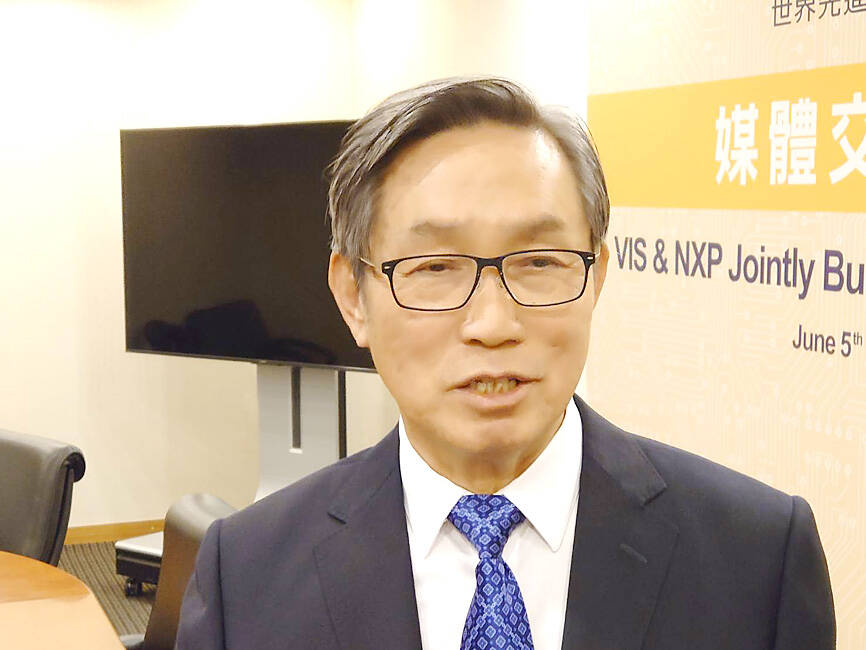Contract chipmaker Vanguard International Semiconductor Corp (世界先進) yesterday posted its strongest profit in three quarters last quarter, but said wafer shipments are expected to dip more than 10 percent sequentially this quarter as customers entered a year-end inventory adjustment cycle.
Net profit last quarter surged 31.4 percent annually, or 18.6 percent sequentially, to NT$2.13 billion (US$66.63 million), thanks to a seasonal pickup in customers demand.
Earnings per share rose to NT$1.29 from NT$0.98 in the same period last year and NT$1.09 in the second quarter.

Photo: CNA
Vanguard expects wafer shipments to slide between 10 percent and 12 percent quarter-on-quarter.
The chipmaker also expects inventory adjustments — likely to extend into the first quarter of next year — to crimp demand for chips used in vehicles and industrial devices.
“Currently, the company has order visibility of two to three months,” Vanguard president John Wei (尉濟時) told investors yesterday.
Photo: Grace Hung, Taipei Times
Its factory utilization rate is expected to drop to about 65 percent this quarter from 73 percent last quarter, while gross margin is estimated to range from 27 percent to 29 percent, compared with 29 percent in the second quarter, the company said.
The company’s blended average selling prices are projected to rise 3 percent to 5 percent this quarter from last quarter, thanks to stronger demand for higher-price power management ICs, offsetting sluggish demand for driver ICs used in flat panel displays, it said.
Power management ICs contributed 66 percent of the chipmaker’s revenue last quarter, while display driver ICs accounted for about 31 percent, company data showed.
Vanguard said it expects to recognize additional income from long-term-agreement customers this quarter following terms renegotiations, which would approximately make up 3 percent to 4 percent of the quarter’s revenue.
The company yesterday raised its capital expenditure for this year again to about NT$5 billion, from an earlier estimate of NT$4.5 billion, due to related spending for the construction of its first 12-inch fab in Singapore through a joint venture, VisionPower Semiconductor Manufacturing Co Pte Ltd (VSMC), with NXP Semiconductor NV.
Its board of directors on Monday approved NT$24.12 billion equipment and facilities expenditures for VSMC and NT$1.18 billion for existing 8-inch fabs.
Despite the capital spending increases, the company aims to keep its cash dividend distribution unchanged at NT$4.5 per share for at least the next three years as it has accumulated significant distributable earnings, Vanguard chairman Fang Leuh (方略) said.

Nvidia Corp’s demand for advanced packaging from Taiwan Semiconductor Manufacturing Co (TSMC, 台積電) remains strong though the kind of technology it needs is changing, Nvidia CEO Jensen Huang (黃仁勳) said yesterday, after he was asked whether the company was cutting orders. Nvidia’s most advanced artificial intelligence (AI) chip, Blackwell, consists of multiple chips glued together using a complex chip-on-wafer-on-substrate (CoWoS) advanced packaging technology offered by TSMC, Nvidia’s main contract chipmaker. “As we move into Blackwell, we will use largely CoWoS-L. Of course, we’re still manufacturing Hopper, and Hopper will use CowoS-S. We will also transition the CoWoS-S capacity to CoWos-L,” Huang said

Nvidia Corp CEO Jensen Huang (黃仁勳) is expected to miss the inauguration of US president-elect Donald Trump on Monday, bucking a trend among high-profile US technology leaders. Huang is visiting East Asia this week, as he typically does around the time of the Lunar New Year, a person familiar with the situation said. He has never previously attended a US presidential inauguration, said the person, who asked not to be identified, because the plans have not been announced. That makes Nvidia an exception among the most valuable technology companies, most of which are sending cofounders or CEOs to the event. That includes

INDUSTRY LEADER: TSMC aims to continue outperforming the industry’s growth and makes 2025 another strong growth year, chairman and CEO C.C. Wei says Taiwan Semiconductor Manufacturing Co (TSMC, 台積電), a major chip supplier to Nvidia Corp and Apple Inc, yesterday said it aims to grow revenue by about 25 percent this year, driven by robust demand for artificial intelligence (AI) chips. That means TSMC would continue to outpace the foundry industry’s 10 percent annual growth this year based on the chipmaker’s estimate. The chipmaker expects revenue from AI-related chips to double this year, extending a three-fold increase last year. The growth would quicken over the next five years at a compound annual growth rate of 45 percent, fueled by strong demand for the high-performance computing

TARIFF TRADE-OFF: Machinery exports to China dropped after Beijing ended its tariff reductions in June, while potential new tariffs fueled ‘front-loaded’ orders to the US The nation’s machinery exports to the US amounted to US$7.19 billion last year, surpassing the US$6.86 billion to China to become the largest export destination for the local machinery industry, the Taiwan Association of Machinery Industry (TAMI, 台灣機械公會) said in a report on Jan. 10. It came as some manufacturers brought forward or “front-loaded” US-bound shipments as required by customers ahead of potential tariffs imposed by the new US administration, the association said. During his campaign, US president-elect Donald Trump threatened tariffs of as high as 60 percent on Chinese goods and 10 percent to 20 percent on imports from other countries.